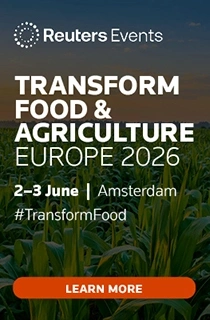
- Industry news
Industry news
- Category news
Category news
- Reports
- Key trends
- Multimedia
- Journal
- Events
- Suppliers
- Home
- Industry news
Industry news
- Category news
Category news
- Reports
- Key trends
- Multimedia
- Events
- Suppliers
CreDA pilots alternative credit scoring model for Brazilian farmers hit by inflation

26 Sep 2022 --- Credit DeFiAlliance (CreDA) has rolled out an alternative credit scoring model for farmers in Brazil. The decentralized credit rating service has built an artificial intelligence (AI) service that evaluates farmers’ farm size, crop conditions, irrigation and yield potential and gives an interest rate based on the assessment.
This system could slash up to 50% of the interest rates that Brazilian farmers have been obliged to pay.
Interest rates in Brazil have been exacerbated by the war on Ukraine and the pandemic. The conflicts have caused inflation in the country, and as a means to slow it down, interest rates have been climbing over time.

These rising rates have driven up the costs of food, fuel and fertilizer, making it more expensive for farmers to do their jobs. On top of that, high-interest rates do not allow farmers to comfortably obtain money to invest in their crops, in turn affecting the food supply.
 CreDA gives a new solution to farmers seeking interest rates. Deflating interest rates with AI
CreDA gives a new solution to farmers seeking interest rates. Deflating interest rates with AI
CreDA aims to offer affordable interest rates to farmers in Brazil. It is doing so as a part of the company’s Credit4Good program.
The program is fusing on and off-chain data to build custom, objective credit risk models that allow farmers access to an additional line of credit with a better and more competitive price.
“In short, Credit4Good allows them to bypass the traditional means of accessing capital, allowing them to their business and help to feed more Brazilians,” says Fredrico Diniz, CreDA’s head of credit risk modeling.
CreDA designed a “fit-for-purpose” model that uses proprietary credit risk algorithms that assess assets and payment behavior both in the traditional system and on the blockchain.
“The model isn’t about creating new assets which can offset credit. It’s about incorporating a farm’s existing, intrinsic essence – from the quality of the land to its past performance – into the credit assessment process,” explains Diniz.
Due to limited competition, Brazil’s top five banks currently administer 80% of the country’s loans. Interest rates right before the pandemic were 4.50%, whereas now they are 13.75% and rising, according to CountryEconomy.
Backed by machine learning
To create the technology needed for assessing the farmers’ interest rates, CreDA partnered with Ager Solution. This company helps increase the efficiency of farms by giving insights into the needs of their crops.
Their evaluation system for farmers incorporates AI as part of what is called the CreDA Oracle. This machine learning algorithm has been trained on billions of activities on-chain related to more than 100 million addresses. Brazillian farmers have been facing high-interest rates as a cause of the pandemic and war on Ukraine.
Brazillian farmers have been facing high-interest rates as a cause of the pandemic and war on Ukraine.
The company also utilizes satellite data and NDVI imaging – which measures the difference between visible and near-infrared light reflectance from vegetation to create pictures of photosynthetic vigor – to create 17 layers of metadata. CreDA will incorporate this data with its own to provide complete and real-time views of a farm’s value and risk profiles.
When it comes to cryptocurrency, users can assess CreDAs personal credit score on the company’s website and use it as a CreditNFT, which ensures that the score is linked to the individual. The score can also be adjusted daily through the user’s behavior in the crypto and Web3 ecosystem.
“In the future, it will also incorporate other considerations into the mix such as environmental considerations, participation in shared materials or cooperatives, or local community engagement, all of which could directly influence a farmer’s creditworthiness,” claims Diniz.
Global food crisis
The world faces an estimated 828 million people facing hunger daily, according to The World Food Programme. In the past two years, the numbers have risen from 135 million in 53 countries pre-pandemic to 345 million in 82 countries today.
“Farmers in Brazil want to contribute to the country’s food security but are faced with unrealistic interest rates for loans needed to expand their farms because the lack of adequate data means banks won’t take the risk,” says Diniz.
Brazil and greater South America have also been facing a coffee bean shortage, and as an attempt to increase prices, farmers of the beans have been holding onto their supply. There is more volatility in the Brazilian food market predicted to come.
Edited by Sabine Waldeck









